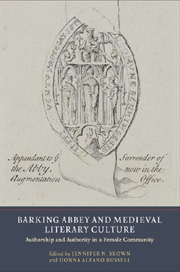Book contents
- Frontmatter
- Contents
- List of Contributors
- Acknowledgements
- List of Abbreviations
- Dedication
- Introduction: Barking's Lives, the Abbey and its Abbesses
- I BARKING ABBEY AND ITS ANGLO-SAXON CONTEXT
- II BARKING ABBEY AND ITS ANGLO-NORMAN CONTEXT
- III BARKING ABBEY AND THE LATER MIDDLE AGES
- 11 Keeping Body and Soul Together: The Charge to the Barking Cellaress
- 12 Rhythmic Liturgy, Embodiment and Female Authority in Barking's Easter Plays
- 13 Liturgy as the Site of Creative Engagement Contributions of the Nuns of Barking
- Afterword. Barking and the Historiography of Female Community
- Bibliography
- Index
- YORK MEDIEVAL PRESS: PUBLICATIONS
11 - Keeping Body and Soul Together: The Charge to the Barking Cellaress
from III - BARKING ABBEY AND THE LATER MIDDLE AGES
Published online by Cambridge University Press: 05 April 2013
- Frontmatter
- Contents
- List of Contributors
- Acknowledgements
- List of Abbreviations
- Dedication
- Introduction: Barking's Lives, the Abbey and its Abbesses
- I BARKING ABBEY AND ITS ANGLO-SAXON CONTEXT
- II BARKING ABBEY AND ITS ANGLO-NORMAN CONTEXT
- III BARKING ABBEY AND THE LATER MIDDLE AGES
- 11 Keeping Body and Soul Together: The Charge to the Barking Cellaress
- 12 Rhythmic Liturgy, Embodiment and Female Authority in Barking's Easter Plays
- 13 Liturgy as the Site of Creative Engagement Contributions of the Nuns of Barking
- Afterword. Barking and the Historiography of Female Community
- Bibliography
- Index
- YORK MEDIEVAL PRESS: PUBLICATIONS
Summary
London, British Library, MS Cotton Julius D VIII, is a composite manuscript containing a number of Latin and Middle English texts. Among them, on folios 40 to 47v, is one probably written after 1453, entitled ‘the charche [duties] longynge to the office off the Celeresse of the Monestarij of Barkynge’ (the Charge). This loosely structured document, largely written in note form with many specific numerical figures, details the special provisions needed, over and above those required for the standard diet, to feed the abbess and convent of Barking during the course of the year. Its internal consistency and its command of detail suggest that the writer had herself acted as cellaress and was noting down information, as a reminder to herself or as a briefing for her successors. This text should therefore be added to our meagre store of writings by later medieval English women, particularly by nuns: this chapter will merely try to use it to cast some light, however oblique, not only on the Barking nuns' daily existence but also on their spiritual lives (or lack of them) in the later Middle Ages, about which we know so little, especially compared with the earlier period.
What exactly was a cellaress? The Oxford English Dictionary defines her as ‘A woman (esp. a nun) in a convent or similar establishment charged with the safe keeping and distribution of provisions’.
- Type
- Chapter
- Information
- Barking Abbey and Medieval Literary CultureAuthorship and Authority in a Female Community, pp. 235 - 244Publisher: Boydell & BrewerPrint publication year: 2012



